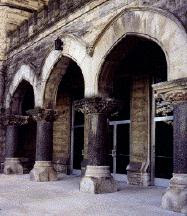Friday, April 23, 2010
Phil Huling of SLU to Give April 23rd Talk
Homeomorphic topological spaces have isomorphic fundamental groups. An obvious questionc is then: when must spaces with isomorphic fundamental groups be homeomorphic? That is, when is the fundamental group a complete invariant? Flat conformal deformation theory investigates this question in the case of hyperbolic orbifolds and further asks if we can describe what happens when the fundamental group fails to be a complete invariant. We will look at what is known about these questions and then we will discuss my recent work with cofinite Coxeter groups and the lattices that contain them. In particular, we are able to develop tools which give the deformation spaces of the reflective Bianchi groups.
Friday, April 16, 2010
Sylvia Carlisle to give April 16th Colloquium
A metric space X is a real tree if between any two points in X there is a unique arc, and that arc is a geodesic segment. An isometry on a real tree is hyperbolic if it has no fixed points. In this talk, I will discuss the continuous theory of real trees with hyperbolic isometries, and discuss the model companion for that theory. As time allows I will talk about some properties of this model companion.
Wednesday, April 14, 2010
Colloquium April 9th by Martz and Parwani
Andrew Mertz and Kamlesh Parwani showed how lottery number distribution could be analyzed using Mathematica. Frequency distributions showed definite anamolies regarding the random nature of the numbers selected in lotteries. But it is generally the case that the odds of winnning are so low that these anomalies can not lead to effective strategies for winning money.
On the other hand, using Mathematica to analyze stock market data, Mertz and Parwani showed that there are low risk stategies that can work.
On the other hand, using Mathematica to analyze stock market data, Mertz and Parwani showed that there are low risk stategies that can work.
Friday, April 2, 2010
Andrew Schultz of UIUC to Give Colloquium April 2nd
Linear algebra is often thought of as a gateway to the abstraction of modern mathematics, but it is also a discipline with a number of terrific real-world applications. In this talk we'll discuss some applications of linear algebra which we encounter in our day-to-day digital lives. Topics include Google's PageRank algorithm, image compression, noise filtering and - if time allows - mp3 compression.
Subscribe to:
Comments (Atom)
